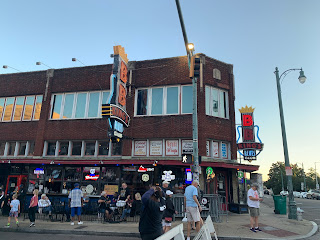- D1 Neutral Feature - Robbie MacPherson
- View from the Field Part 5 - Field Labor Disruption
- Jurisdiction - Employee Training, Alone, May Subject You to a Foreign State’s Jurisdiction
- Pennsylvania Superior Court Places Time Limit on Good Faith Withholding Under Prompt Pay Act
- Contractual Claims Protection: A Checklist for Owners
- D1 Neutral Feature - John Bulman
- Twists and Turbines - A New York Case Highlights an Owner’s Risk When Not Using Full-Wrap EPC Delivery
Articles on Construction Litigation & Dispute Resolution by Division 1 of the ABA Forum on Construction Law
Thursday, December 22, 2022
What's Up With Division 1 (No. 18) -- Happy Holidays and Happy New Year!
Monday, December 19, 2022
COURTHOUSE REPORTER SERIES: Twists And Turbines: A New York Case Highlights an Owner's Risk When Not Using Full-Wrap EPC Delivery
New York State Thruway Auth. v. CHA Consulting, Inc., 165 N.Y.S.3d 832 (Albany Co., Sup. Ct. 2022).
This case involved a dispute over a wind turbine project. The root cause of the dispute was a bust between the “wind turbulence” at the site, and the wind turbulence that the turbines installed could withstand. Once the project was completed and commissioned, the overworked turbines prematurely failed.
The New York State Thruway Authority (the owner) sued CHA Consulting, Inc. (the designer), the Kadney Company (the general contractor), Vergnet (the turbine supplier), and two different site engineers: Prudent Engineering, and Ravi Engineering and Land Surveying (the engineers). The New York Supreme Court (New York’s trial court) dispatched all of the owner’s claims on summary judgment.
The designer, which had specified the wrong type of turbine, invoked New York’s three-year statute of limitations to defeat the owner’s professional negligence claim. The owner argued that the statute should run from the date of its acceptance of the work and issuance of a final certificate. But the statute makes clear that it runs from the professional’s “completion of performance under the contract.” With the designer out of the picture based on the timing of its work, the owner’s creative attempts to hold others responsible fell flat.
The general contractor defeated the owner’s claims because the designer specified the exact make and model of turbine, and the general contractor procured and installed those exact turbines. It was not the general contractor’s responsibility to verify that the turbines were suitable for the site, therefore the general contractor could not be held responsible. Even if the general contractor was somehow responsible for the verification, the owner accepted the general contractor’s work during inspection, and found it in general conformance with the contract plans and specifications.
The turbine supplier defeated the owner’s warranty claim because its warranty contained an exclusion when the site conditions were the cause of the issue. The owner argued that the turbine supplier should be estopped from taking advantage of the exclusion because it did not verify that the turbines were suitable for the site conditions. The Court disagreed, finding that the warranty did not create any duty for the turbine supplier to independently verify suitability. The various disclaimers in its contract were a further backstop against this argument.
The engineers defeated the owner’s claims because the Court found that their obligations were limited to confirming that the turbines supplied were the same as the turbines specified. The Court made this ruling primarily because the specification at issue was a “closed proprietary specification, with no substitutions allowed.” Had a less-detailed and more traditional performance specification been used, the engineers would have had greater responsibility to verify conformance.
In conclusion — it is not uncommon for an owner to
separately contract with the major players on a construction project, as
opposed to entering a full-wrap EPC agreement, but such an arrangement presents
certain risks. Two of the most notable risks are scope gaps, and as
demonstrated in this case, liability gaps. The designer in this dispute was
able to avoid liability because its work was complete long enough before the
problem was discovered that the statute of limitations had run, which left the owner
without a party to pursue. A full-wrap EPC agreement would likely have allowed
the owner to avoid this situation.
*This blog article was previously posted on the Troutman Pepper website.
Author Todd Heffner is an Associate with Troutman Pepper in its Atlanta office. His practice covers construction matters, including in federal court and arbitration.
Wednesday, December 7, 2022
Meet D1’s Neutrals Series: JOHN E. BULMAN
Company: Pierce Atwood LLP
Location: Providence, Rhodes Island
Email: jbulman@pierceatwood.com
Webpage: https://www.pierceatwood.com
Law School: Georgetown University Law Center, J.D., cum laude;Editor, Law and Policy in International Business (1984)
Types of ADR services offered: Mediation, Arbitration, Dispute Review Boards, Online Dispute Resolution (ODR)
Areas served: NationwideAffiliated ADR Organizations: American Arbitration Association (AAA) International Institute for Conflict Prevention & Resolution (CPR) International Centre for Dispute Resolution (ICDR) College of Commercial Arbitrators (CCA) Chartered Institute of Arbitrators (CiArb) Rhode Island Superior Court Rhode Island Federal District Court International Chamber of Commerce (ICC)
Location: Providence, Rhodes Island
Email: jbulman@pierceatwood.com
Webpage: https://www.pierceatwood.com
Types of ADR services offered: Mediation, Arbitration, Dispute Review Boards, Online Dispute Resolution (ODR)
Areas served: Nationwide
Q: Describe the path you took to becoming an ADR neutral.
A: Early in my career, I was an advocate in several AAA construction-related arbitrations. The AAA saw fit to add me to its Panel of arbitrators around 1990. Since then, I have served as an arbitrator or mediator in approximately twenty states.
Q: What percentage of your current legal practice is spent on ADR work?
A: 90% or more of my time is spent as a neutral.
Q: Describe your background and experience mediating and arbitrating construction cases.
A: I have served as a mediator in over 100 construction cases since 1990. I have served as an arbitrator and rendered awards in at least fifty arbitrations, ranging from $500,000 to $220,000,000 in controversy. Most of the larger cases have been three-arbitrator panels; I have served as chair in the majority of those cases.
Q: Mediators are oftentimes described as “facilitative,” “evaluative,” or “transformative.” Do you have a style?
A: Each case calls for a specific emphasis and/or technique but I certainly lean toward facilitative negotiation.
Q: Do you have any practices that you find make you particularly effective as a mediator?
A: Asking open-ended questions to prompt each party to fully articulate not only the merits of the case but also how counsel expects to meet the other side’s defenses or counterclaim.
Q: Do you recommend individual preparatory meetings with the parties and counsel prior to the joint session?
A: Yes. Gaining a better understanding of the dispute background and prior settlement discussions saves time and energy at the mediation session itself. It also preempts “going down the wrong road” at the mediation.
Q: What should attorneys and their clients take into consideration when vetting and/or selecting an arbitrator?
A: The arbitrator’s subject matter expertise and ability to manage the process efficiently.
Q: What advice do you have for parties when considering whether to choose a single arbitrator or a panel?
A: Cases with a large amount in controversy or where the technical expertise of a particular arbitrator is important are cases where a three-member panel is effective and appropriate. Cases with several parties are also situations where a three-member panel is appropriate.
Q: Do you think limits should be placed on discovery in the arbitration context?
A: There should be limits since arbitration is not supposed to be a mirror image of litigation.
Q: What role should traditional rules of evidence play in the arbitration hearing?
A: By the time hearings take place, there should be a limited number of exhibits that are in controversy. This is the only time when the “rules of evidence” have a bearing, and they have a limited bearing.
Q: What are some of your interests or hobbies outside of your ADR Neutral practice?
A: Furniture making and fly-fishing.











